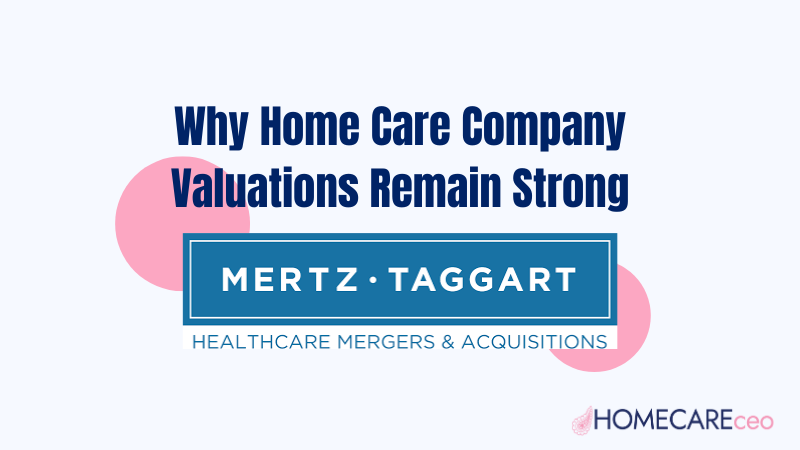By Stephen Tweed
In a world filled with uncertainty and challenges, the healthcare services at home sector has proven to be a stable and resilient industry. This resilience extends to the valuation of Home Care companies with an EBITDA range of $500k to $10 million. Cory Mertz, Managing Partner at Mertz-Taggart, our Resource Partner, has delved into this topic in a recent article titled “Why Valuations for Lower Middle Market Healthcare Services Companies Remain Strong.”

While I was speaking for the Private Duty at NAHC Private Duty Summit I had the opportunity to catch up with Cory at the National Association for Home Care and Hospice annual conference in Washington, DC. I really appreciate Cory’s willingness to have a conversation with home care company owners about what their company is worth, and how they can increase the long-term value.
Valuation Resilience in Home Care Services
The home care sector has shown great stability in the turbulent waters of the business world. Even within the lower middle market, where companies typically generate EBITDA between $500k and $10 million, home care companies have displayed impressive resilience in terms of valuations. Cory highlights several reasons behind this phenomenon:
Fundamental Demand
The demand for healthcare services remains constant. People require medical care regardless of market fluctuations, economic downturns, or geopolitical events. This inherent demand creates a steady stream of customers for healthcare service providers, making them a dependable investment.
Fragmented Market
The healthcare services sector is characterized by a high degree of fragmentation. Numerous small and medium-sized players operate within the industry, which encourages consolidation. This consolidation trend can result in strong valuations for companies that stand out in terms of service quality, market share, or operational efficiency.
Private Equity Interest
Private equity firms are increasingly interested in the healthcare services sector. These firms are attracted to the predictable cash flows, low correlation with economic cycles, and the opportunity for growth through consolidation. The influx of private equity capital into the sector bolsters valuations and creates competition among buyers.
Regulatory Stability
The healthcare industry is subject to significant regulation, which can be a double-edged sword. On one hand, it creates barriers to entry, making it challenging for new competitors to emerge. On the other hand, it provides a sense of stability, as the regulatory environment doesn’t change rapidly. This predictability is appealing to investors.
Operational Resilience
Many healthcare services companies have shown operational resilience during challenging times, such as the COVID-19 pandemic. Their ability to adapt to changing circumstances and continue providing essential services underscores their value in the market.
Factors Driving Valuations in Home Care
Beyond these points, several additional factors contribute to the robust valuations within the healthcare services sector:
Demographic Trends
The aging population in many developed countries drives increased demand for healthcare services. As the baby boomer generation continues to age, the need for medical care, especially in areas such as home healthcare and assisted living, is expected to rise.
Technological Advancements
Healthcare services are benefiting from technological advancements, which enhance efficiency and patient care. Companies that leverage technology to improve their services are often rewarded with higher valuations.
M&A Activity
Merger and acquisition activity remains strong in the healthcare services sector. Buyers are actively seeking out opportunities to acquire and consolidate businesses, which can lead to competitive bidding and increased valuations for attractive targets.
Quality of Care
Healthcare companies that prioritize quality of care, patient outcomes, and regulatory compliance tend to command higher valuations. Reputation and the ability to deliver superior services are critical factors in valuation.
Diversification: Diversification across various service lines within healthcare, such as primary care, specialty services, and ancillary services, can mitigate risk and increase valuations. Companies offering a wide array of services can better weather market fluctuations.
Geographic Expansion
Expanding into new geographic areas or regions with underserved healthcare markets can open up growth opportunities and boost valuations. Companies with a well-thought-out expansion strategy are often seen as more valuable.
What This Means for You
In a world where economic conditions can change rapidly, the healthcare services sector has proven itself to be a bastion of resilience. Cory Mertz, Managing Partner at Mertz-Taggart, highlights the strength of valuations in lower middle market healthcare services companies in his recent article. The sector’s inherent demand, fragmented market, private equity interest, and regulatory stability are all key factors that support strong valuations.
Moreover, demographic trends, technological advancements, M&A activity, quality of care, diversification, and geographic expansion play a pivotal role in driving valuations higher within the healthcare services sector. These factors collectively contribute to the stability and strength of valuations in the lower middle market healthcare services industry.
As businesses and investors navigate this shifting landscape, it’s clear that the home care sector’s strength and resilience are based on a foundation of fundamental factors that are likely to remain strong for years to come.
What is Your Home Care Company Worth?
As an owner of a growing, profitable home care company, you are probably asking yourself several questions:
- What is my company worth today?
- What can I do to grow the value of my company?
- How will I know then it is time to exit?
- What is the best exit strategy for an owner like me?
For a no-obligation conversation about these questions, reach out to Mertz-Taggart and set up a conversation with Cory Mertz or Bruce Vanderlaan.
Mertz-Taggart – 2161 McGregor Blvd. Suite D, Fort Myers, FL 33901 – 770.888.1171


